- Home
- Bonnye Matthews
The SealEaters, 20,000 BC Page 9
The SealEaters, 20,000 BC Read online
Page 9
The piece Emuka had was in length a measure of his longest finger past his wrist to mid forearm. It was about as thick as his longest finger. It would become SealEater size and would be thinner than most of the other SealEaters were capable of making. Being made of this stone, it would be beautiful as well as functional. The rhythm came to Emuka. After a short time he no longer felt pain or was much concerned with his environment. He and the stone had merged in a strange way and he was simply revealing the spear point which had been hidden in the rock so all could see it. It would then be useful. At the moment only he could see it.
The Maiket watched in utter silence as the small flakes slid from the stone down the leather and into the basket. No one came by to interrupt. This place was very quiet. Emuka continued tapping sometimes hard and at other times softly. He twisted the stone back and forth looking across the edges he’d made. He’d cease tapping and rub briskly a stone across the newly formed edge to dull it. The process repeated and repeated. Each of the men watching tried to guess what Emuka would do next. They anticipated while they learned. If they guessed wrong, they tried to watch to learn why they guessed wrong.
While he worked, Chief Dai was taking his measure of the man. So far he was impressed. The man was intelligent, made tools with care and precision, had good focus on work, asked for what he wanted, appeared to want to do well at his task. Clearly, the man could do these things while in pain. He also was considerate enough to let watchers see what he was doing.
Emuka never noticed the woman who came into view to his right with a tray of food. The chief waved her off. Emuka missed that also. The chief and the two men had noticed that as he worked, Emuka hummed to himself. They realized he was very deeply involved in his work.
After the basic form was successfully completed, Emuka began to tap lightly around the edge on first one side and then on the other. He made note of the ridges and low places on the basic form and began to determine the steps he’d take to continue thinning the stone to flatten it evenly on both sides. He studied the rock in his hand. He executed a few more taps and examined it again. He made a small platform on the edge and then took an antler with the thick end placed on the stone and the pointed edge braced against his right leg. Using a separate antler’s thick end, he struck the antler that was braced against the stone. Off came a flake that travelled all the way across the width of the piece. Emuka smiled, unaware that he did so. He continued that process for a long time.
Those who watched had never seen anyone use the two antlers to strike a flake while making a tool. The chief had risen and squatted by Emuka to watch. Emuka was distracted for a moment but he was not focused on anything intricate, so it was not unsettling.
One of the men who had come to watch noticed that blood was beginning to drip from Emuka’s leg. He pointed it out to the chief.
The chief said, “Emuka, stop.”
Emuka looked up startled.
The chief called loudly, “Nagangna!”
The old woman crabbed out of the large structure and began to move toward the chief who stopped her before she’d gone far.
“The wound bleeds,” he said to her.
The old woman returned to the large structure. She came back with a basket of items. She said something to one of the men. Emuka could not understand for she spoke it quickly. The man left right away.
The chief and the other observer lifted Emuka off the rock and laid him on the ground. They indicated a problem with his leg. He looked and saw blood coming from the wound. The old woman was wiping the wound. Some pus came out on the soft leather wipe.
Emuka groaned when he saw the observer return with a piece of wood on fire at the end. The old woman took the piece of wood and while the three men held Emuka down, she shoved it into the wound. Emuka shrieked.
She removed the wood from the wound and poured a mixture of honey and herbs into the wound. She took a bone needle and pulled the gaping wound together but with enough space between the ties that the wound could still drain. Emuka felt exhausted.
The old woman told him mostly by signs, “Stay flat. I’ll return when it’s okay for you to sit up. You’ll be able to do more stone work later this day.”
Emuka lay there, staring into the tree top. Such a huge tree it was. An oak that had branches that almost covered the huts, and what that one didn’t cover the other two oaks in the area did. Such huge things.
Emuka shut his eyes and remembered. The sea voyage was truly amazing. I had a wonderful time riding the huge waves of the monster storm. As soon as I understood the way the boats took to the water, I lost my initial fear. We were given to see splendors of the sea that others cannot imagine. The tall waves and the great chunks of ice. What a sight to see! When the colored waves in the sky matched the turbulent sea—that was the peak of excitement for me. The waving colors in the sky that night seemed almost to pull me towards them in adoration. And then when we’d slide down a giant wave or rise up on one, you could feel the power of the sea as never before. The great unbound power of the sea. What exhilaration! How it made my blood flow through my body! It was as I’d expect it to be if we were able to visit the gods. Great power unleashed: visible, palpable, power almost having a scent of its own!
Emuka realized he needed to make water. He was embarrassed. To have needed help with something like that back at the Cove was one thing; in this place where he was captive, quite another. He looked at the chief and indicated his need. The chief half smiled.
“Nagangna!” he cried.
The old woman appeared at the entry to the large structure. She held up a red clay container taller than it was wide. The chief nodded. She brought the container and showed Emuka how to use it. He did. He smiled at her with gratitude. “Thank you,” he said.
She nodded, having no idea what he said. She took the container and went off to the far edge of the village where she emptied it down the riverbank, beyond the point where the people gathered their clean water.
The chief called to a woman who brought food. The men ate. The women had prepared horse, turtle, greens, artichoke tubers, and fruit. Having been so deeply involved with his spear point making and then with the shock of having the blood stopped so painfully, Emuka didn’t think he hungered. When he tasted the food, however, he found he was very hungry and the food was delicious.
A few men started a fire which provided Emuka even more light than he needed, though the sky had darkened and a few stars had appeared. Once the food and bowls had been removed, Emuka had help to sit again on the rock to continue the spear point making. He began to do the final overshot flaking to regularize the width of the spear point. When Emuka did this he was most cautious. Overshot flaking meant flaking from one side to the other side across the large stone. One wrong strike would likely shatter the point in the middle. Finally, Emuka began pressure flaking with the antler point along the edges to remove any remaining tiny fractures that might exist and to make a standard edge. He was well pleased with this spear point.
When Emuka finished, he turned, looking directly at Chief Dai. He pressed his finger against the edge of the spear point and brought blood. Emuka put his finger in his mouth and extended the spear point to the chief. More people had gathered to watch. Women had gathered their children and all were fascinated with the stranger who made the huge spear point. There was silence while the people watched.
The chief took the spear point and examined it. He pressed his finger against the edge of the spear point. His finger bled. He smiled a broad smile, stood, walked over to Emuka, took Emuka’s hand, and pressed wound to wound.
“Good work!” the chief said.
Emuka nodded.
“You make spear points, while you cannot walk,” Chief Dai told him, and Emuka understood. He motioned for the two men who had been stretcher bearers to take him back to the structure where Nagangna lived.
Emuka could not understand the people’s acceptance of him. He fully expected to be killed, but instead he’d been disab
led. He was treated well. It was confusing to him. Not that he wasn’t grateful. He was. He just could not understand. He had tried to build himself up so he would die well, not fearfully—all for no apparent reason.
The stretcher bearers carried him to a different place in the large structure. There were several older women there and his place was far toward the back. Someone had placed pine branches on the ground and covered them over with a thick, furred skin, probably bear, Emuka speculated. There was a skin with fur removed. He used it to cover himself. He lay on the sleeping place and was grateful for the comfort. The old woman brought him a bowl of water and his relief container. She examined the wound and smiled, patted his shoulder, and crabbed off to her sleeping place.
Emuka lay there. He thought, These people have accepted me, though they ran off all of us SealEaters. I’m sure it was Reg’s way of being that caused their animosity. I cannot understand that man, though I have lived near him all my life. He should never have been an elder. He has harmed our people in almost every way possible. People who are not SealEaters certainly are not impressed. Among the SealEaters he is seen to have much power. We probably contributed by failing to stand against him, but every time someone tried, they were beaten down. Reg knows how to make people suffer mightily. When he threatened the chief I was horrified. The chief is many things, no doubt, but weak and cowering is not one of them. Aside from that he has many warriors, far more than there were of us. Reg just thinks that all think as he does and what took place at home applies everywhere. He will discover his error someday, I expect. I’ve always heard that Reg has a terrible secret. I don’t know whether it’s true. If it is, I don’t know what his secret could be.
Emuka moved a bit to avoid a branch that had an uncomfortable hardness to it. He continued reviewing, I was happy to be in Urch’s boat. I was given a special brother in Urch. Plak was with us, and he was a great rower. He was distraught about his sister. Being on Reg’s boat—not even as wife—put her in a dangerous position, if she became pregnant. He kept watching, but none of us ever saw Reg do anything to her, except insist she row. He kept her in constant panic. I don’t know what became of her. I know she was terribly frightened the whole time. We all thought she ran off from the camp that night. When Murke and Akla left, we wondered whether they’d taken her, but when we met up with them, it was clear they had no idea what happened. I hope she wasn’t eaten by a wild animal. Reg has a problem with women except for his wife, Waywap. He seems genuinely to love her. I’ve never seen him treat anyone that well. When he grabbed the woman in this place, one of the warriors speared his arm. Reg was ready to attack the man who speared him only to find six warriors with spears raised. Reg backed down quickly, bragging about how he could take them all, but didn’t want to create a lot of injuries. I think based on what I’ve seen tonight, the woman he grabbed is the wife of the one who raised his spear first.
Emuka moved his head just slightly and went black until he awakened the next morning from Nagangna’s wiping his wound. It no longer seemed to be so flaming red. He didn’t see gobs of pus as he had seen the other day. He credited Nagangna with knowing what she was doing. He used the relief container she’d given him, and she left the place with it filled.
The stretcher bearers arrived. They put Emuka’s arms over their shoulders and helped him walk to the place where the rock remained. They made it clear he was to put no weight on his left leg. He sat down on the rock ready to begin another spear point. The chief came out from the large structure. He had a pipe, though Emuka didn’t know what it was. The pipe was made of clay and wood. There was something, Emuka noticed, burning in the bowl at the end of the pipe. The chief inhaled and blew smoke to the east. He repeated the process and blew smoke to the west. He repeated the process and blew smoke to the north. Finally, he did the same, blowing smoke to the south. Then he said a lot of words that Emuka never had heard. Emuka knew all this was very serious; he just had no idea what it was about. He thought it must have something to do with a ceremony honoring their gods. Emuka was fascinated. He noticed all stood while this event occurred. He couldn’t stand without help, and no one came to help him, so he decided it was acceptable for him not to stand.
After the ceremony Emuka noticed a large basket had been placed next to the one where the rocks were stored. Someone had replaced the stones in their original basket. The leather liner with flakes and chips had been carefully placed to line the basket that had just appeared. The new one was well worn in comparison with the one he’d used the day before. He understood.
Food was served and all the people ate in the area where Emuka and Chief Dai were sitting. While they ate, they were quiet and remained seated. Emuka watched. It appeared as though children were not permitted to stand up until they had permission to do so. The children were well behaved, he noted. There was much fruit and some things that Emuka had never seen. He tasted them and they were very good. Never in his life had Emuka eaten so many greens, root vegetables, and fruit. He found the flavors sensational.
He began to work, but found the closeness of the two men from the day before a little disconcerting. Then, he realized he was not only expected to make spear points but also to teach these two men how to do it. That caused him to relax. He was glad to teach them. First, they would watch, and later they would try it themselves.
“Emuka,” he said to them, pointing towards himself.
They repeated his name. Then one said, “Moah,” and the other followed quickly with “Buph.”
Emuka began making one of the points from the second piece of obsidian. He studied the piece for a long time. “Moah, Buph, I look first to see where to expect to begin flaking. I want to thin the depth of this large piece without causing too great a decrease in width.” With his fingers, he tried to show what his words said. He knew they probably didn’t understand but would remember a little of the ideas he was putting forth.
After his long study of the piece, Emuka began initial thinning and establishing the basic form. He went a little slower to let them see what he was doing. He’d point out how to establish a platform, how to strike it, and the flake that resulted from the strike. Emuka let them hold it before and after the strike. He let them remove and replace the flake that he’d struck off. Emuka would show them carefully how he wished to smooth the ridges at the edges of the flaked spear point. It was good to have them feel things. So much of spear making was feel.
At one point he told them, “There is a rhythm to making spear points. You need to know what you’re doing. You don’t want to think too much. Enter into the rhythm of thinning. This is how it looks.” Emuka speeded up the work he was doing. They could see what he had been saying though they didn’t catch every word. They understood the rhythm, for they made points themselves, but never had they done anything so complex or thin. The thinness of the large point he made yesterday awed the men. The Maiket were also drawn to the beauty of the point. They didn’t doubt it was successful in killing. They wanted very much to be able to make spear points like Emuka was able to make, points with function and lovely form. Emuka stressed trying to see the finished product when first examining the stone they’d work.
The work on spear points went on for days. Emuka had to keep cautioning Buph that when he left the platform too thick, a flake from it would not travel far, too thin and the flake will not be large enough. After continuing to break basic forms or even almost completed spear points, Buph was gaining skill. Moah had a different problem. He kept forgetting to watch where he put his fingers to brace the rock for a tap. Consequently, he kept blocking the travel of his flakes. It made it tough to work the centers. It also caused him to narrow the width of the point.
“Oh, no, I’ve broken another point,” Buph moaned.
Emuka waited.
Buph continued working on the beautiful piece now with a pointed end and a flat end. He noticed a bit of a point projecting at the bottom of the flat end. He set up and struck, aiming carefully at the projection, a
s if it were a platform. When he turned his hand to see what flaked off, he discovered the beautiful flute caused by the strike. He looked at Emuka, who was watching him intently.
Buph turned the stone and began with a pointed deer antler to construct a platform on the side where the flute was. When he struck that, a flute formed on the opposite side of the rock.
Buph, glowed. He said, “I will return fast.” He went quickly to his hut. He returned with a broken spear shaft. He took his knife and shaped the end of the shaft into a dome. He carefully carved a notch into the end of the wide broken spear shaft that now would become a knife handle. He placed the wooden halves of the spear shaft to align with the fluted sections. The wood fit into the grooves as if it had been made for that purpose. Both Emuka and Moah came to see closer. Emuka grinned broadly. With the short handle, they were looking at a knife that would be extremely useful for separating the skin from a killed animal. This could also be a new style for spear points. They had to wait until the great fire at night when Buph could take the pine pitch glue sticks and sinew to merge the shaft and spear point. It was very clear that through a mistake they’d all learned something new. Everyone could see it.
Emuka worked hard to learn the language. He had gained a basic understanding of it when, after examining the wound, Nagangna told Emuka he should begin walking. He was delighted. He found his leg a little weaker than the other, but he was fully able to walk.
Chief Dai took a walk with him to the pond at the top of the hill.
“From here you can see for long distances everywhere,” the chief said throwing wide his arms to take in all while he turned around. It is a good land.”

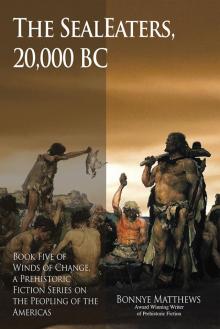 The SealEaters, 20,000 BC
The SealEaters, 20,000 BC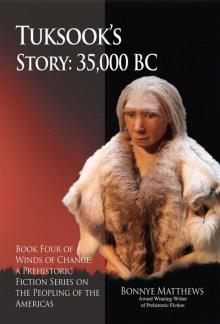 Tuksook's Story, 35,000 BC
Tuksook's Story, 35,000 BC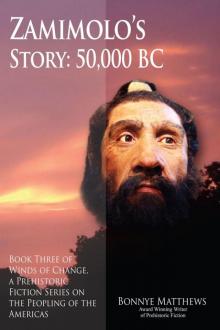 Zamimolo’s Story, 50,000 BC: Book Three of Winds of Change, a Prehistoric Fiction Series on the Peopling of the Americas (Winds of Change series 3)
Zamimolo’s Story, 50,000 BC: Book Three of Winds of Change, a Prehistoric Fiction Series on the Peopling of the Americas (Winds of Change series 3)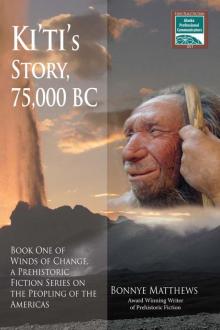 Ki'ti's Story, 75,000 BC
Ki'ti's Story, 75,000 BC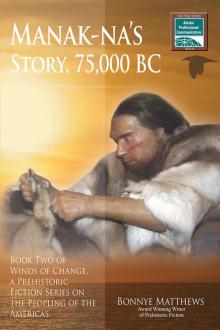 Manak-na's Story, 75,000 BC
Manak-na's Story, 75,000 BC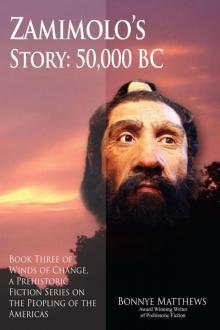 Zamimolo’s Story, 50,000 BC
Zamimolo’s Story, 50,000 BC